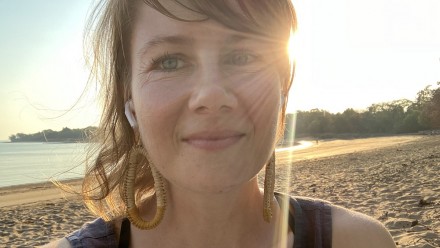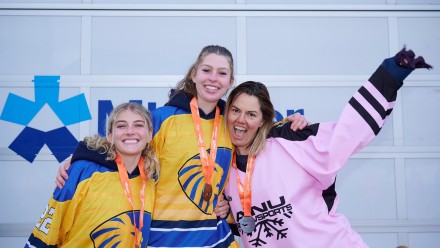A cultural and clinical learning experience in the Northern Territory
Travelling to Tennant Creek in the Northern Territory takes longer than many overseas flights. When flying from Canberra, it can take up to two days.
The township of 3,500 people sits on Patta Warumungu land and approximately half the population is Aboriginal.
Third year Doctor of Medicine and Surgery Indigenous Health Stream students, Ms Emily Rickard and Mr Liam McBride Kelly were given the unique opportunity to explore the remote township and experience its Aboriginal cultures.
Their six-week clinical placement at Tennant Creek Hospital, plus a visit to the nurse led clinic at Ali Curung – a remote Aboriginal community two hours away from Tennant Creek - offered an extraordinary learning experience.
Ms Rickard and Mr McBride Kelly took every opportunity to immerse themselves in cultural learning while in Tennant Creek.
“This placement opened my eyes to the real complexities and nuances around Indigenous and remote health, things you can’t read about in a textbook,” Ms Rickard said.
“It was great to see translators regularly attending ward rounds, as many patients speak English as a second or third language,” Mr McBride Kelly added.
“We had the opportunity to undertake cultural safety training with a local community leader, which was enlightening and really helped me work effectively in the community,” Mr McBride Kelly explained.
Ms Rickard added, “Everyone we met in the town was very welcoming and because the community is quite transitory they are used to showing people what Tennant Creek has to offer. There were free community events on every week, such as yoga classes, outdoor movie screenings and markets that I attended to get a sense of the community, which I thoroughly enjoyed.”
“Some of the doctors were locals, while others were Fly-In Fly-Out (FIFO), so we met some inspirational doctors with unique career paths that demonstrated the broad and wonderful adventures medicine can take you on,” Ms Rickard observed.
“I had never worked with rural generalists prior to this placement. I was excited to see how broadly their scope of practice extends, and how they expertly exercise their clinical judgement while operating in a resource limited setting,” Mr McBride Kelly noted.
“Rural generalists can staff an emergency department, run a ward round, see general practice patients, and solve any clinical problem in between. In this type of setting, the importance of clinical examinations and bedside investigations cannot be understated.”
“Having the opportunity to parallel consult, which involves seeing a patient on my own before the senior doctor also reviews the patient, was challenging but great training. In the Emergency Department I was the first person on the medical team to see a patient, take their history, do physical examinations, take blood for tests, ask for imaging, and formulate a plan. I then presented the patient to a senior doctor who would review the patient and adjust the plan. This experience really helped develop my clinical reasoning,” Mr McBride Kelly said.
Both students also had the opportunity to shadow other health professionals, such as paramedics and nurses.
“Going out with paramedics in the ambulance offered the unique privilege of meeting patients in their homes. This helped me to better understand the experience of the patient – from home, to the Emergency Department and then potentially on to Alice Springs with the Royal Flying Doctor Service,” Mr McBride Kelly said.
They are now back in Canberra undertaking a paediatrics rotation, but there is no doubt, the memory of their time in Tennant Creek is one that will stay with them for life.
“We’d like to thank the doctors and nurses at Tennant Creek Hospital for the extraordinary support and teaching offered and extend a very special ‘thank you’ to the ANU Rural Clinical School* and the Indigenous Health team* for organising this fantastic opportunity.”
*This placement was made possible through ACT Department of Health and Commonwealth program funding.














